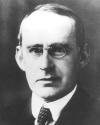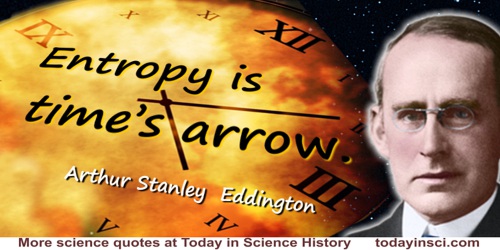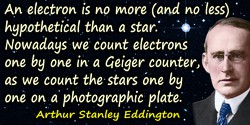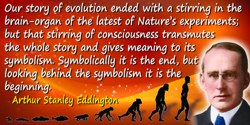 (source)
(source)
|
Sir Arthur Stanley Eddington
(28 Dec 1882 - 22 Nov 1944)
known for his work on the motion, distribution, evolution and structure of stars. He also interpreted Einstein's general theory of relativity. He was one of the first to suggest (1917) conversion of matter into radiation powered the stars.
|
Sir Arthur Stanley Eddington Quotes on Entropy (6 quotes)
>> Click for 129 Science Quotes by Sir Arthur Stanley Eddington
>> Click for Sir Arthur Stanley Eddington Quotes on | Atom | Electron | Knowledge | Nature | Star | Theory | Universe |
>> Click for 129 Science Quotes by Sir Arthur Stanley Eddington
>> Click for Sir Arthur Stanley Eddington Quotes on | Atom | Electron | Knowledge | Nature | Star | Theory | Universe |
Entropy is time’s arrow.
— Sir Arthur Stanley Eddington
Let us draw an arrow arbitrarily. If as we follow the arrow we find more and more of the random element in the state of the world, then the arrow is pointing towards the future; if the random element decreases the arrow points towards the past … I shall use the phrase “time's arrow” to express this one-way property of time which has no analogue in space.
— Sir Arthur Stanley Eddington
Gifford Lectures (1927), The Nature of The Physical World (1928), 69.
So far as physics is concerned, time’s arrow is a property of entropy alone.
— Sir Arthur Stanley Eddington
Gifford Lectures (1927), The Nature of the Physical World (1928), 80.
Take the living human brain endowed with mind and thought. …. The physicist brings his tools and commences systematic exploration. All that he discovers is a collection of atoms and electrons and fields of force arranged in space and time, apparently similar to those found in inorganic objects. He may trace other physical characteristics, energy, temperature, entropy. None of these is identical with thought. … How can this collection of ordinary atoms be a thinking machine? … The Victorian physicist felt that he knew just what he was talking about when he used such terms as matter and atoms. … But now we realize that science has nothing to say as to the intrinsic nature of the atom. The physical atom is, like everything else in physics, a schedule of pointer readings.
— Sir Arthur Stanley Eddington
From a Gifford Lecture, University of Edinburgh (1927), published in 'Pointer Readings: Limits of Physical Knowledge', The Nature of the Physical World (1929), 258-259.
The law that entropy always increases—the Second Law of Thermodynamics—holds, I think, the supreme position among the laws of Nature. If someone points out to you that your pet theory of the universe is in disagreement with Maxwell’s equations—then so much the worse for Maxwell’s equations. If it is found to be contradicted by observation—well these experimentalists do bungle things sometimes. But if your theory is found to be against the second law of thermodynamics I can give you no hope; there is nothing for it but to collapse in deepest humiliation.
— Sir Arthur Stanley Eddington
Gifford Lectures (1927), The Nature of the Physical World (1928), 74.
The law that entropy increases—the Second Law of Thermodynamics—holds, I think, the supreme position among the laws of Nature.
— Sir Arthur Stanley Eddington
Gifford Lectures (1927), The Nature of the Physical World (1928), 74.
See also:
- 28 Dec - short biography, births, deaths and events on date of Eddington's birth.
- The Eddington Enigma, by David Evans, David S. Evans. - book suggestion.




 In science it often happens that scientists say, 'You know that's a really good argument; my position is mistaken,' and then they would actually change their minds and you never hear that old view from them again. They really do it. It doesn't happen as often as it should, because scientists are human and change is sometimes painful. But it happens every day. I cannot recall the last time something like that happened in politics or religion.
(1987) --
In science it often happens that scientists say, 'You know that's a really good argument; my position is mistaken,' and then they would actually change their minds and you never hear that old view from them again. They really do it. It doesn't happen as often as it should, because scientists are human and change is sometimes painful. But it happens every day. I cannot recall the last time something like that happened in politics or religion.
(1987) -- 


